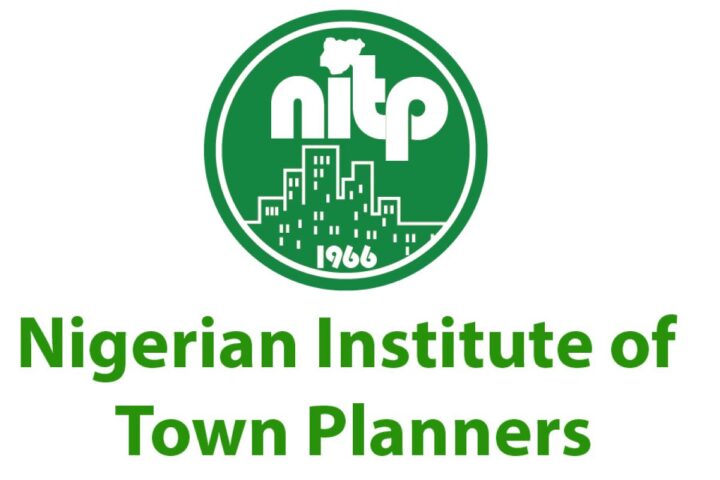The Nigerian Institute of Town Planners (NITP) has inaugurated a high-powered panel to oversee the effective execution of planning laws across the country, in what is seen as a critical step towards promoting sustainable urban development and addressing Nigeria’s mounting challenges in city growth, infrastructure provision, and land use management.
The panel, according to the NITP leadership, is tasked with developing practical frameworks to guide the enforcement of existing planning regulations, ensure compliance by stakeholders, and strengthen collaboration between professional bodies, state governments, and federal authorities.

Speaking during the unveiling in Abuja, NITP President, Nathaniel Atebije, said the move was in response to the growing concerns about weak planning structures, disorderly city expansion, and inadequate enforcement of urban development guidelines. He noted that despite the presence of several planning laws, the lack of proper implementation has led to urban sprawl, congestion, flooding, housing deficits, and deterioration of infrastructure in many Nigerian cities.
“Planning is at the heart of sustainable growth, yet Nigeria has consistently struggled with execution. This panel is our institute’s way of ensuring that our laws do not just exist on paper but are applied to shape the livable, functional, and resilient cities our people deserve,” Atebije stated.
The NITP boss explained that the panel will also serve as an advisory body, working closely with ministries, departments, and agencies at different levels of government to build capacity and improve compliance mechanisms. He added that the committee will recommend legislative reforms where gaps exist in current laws, while also exploring ways to integrate modern technology and data-driven planning into Nigeria’s urban management system.
Urban planners across the country have welcomed the initiative, saying it could transform the trajectory of city development if properly executed. Professor Olufemi Olajide, a town planning scholar, observed that while Nigeria has an elaborate planning framework on paper, enforcement has been the weakest link. “The difference between Nigeria and countries that have thriving urban systems is not the absence of planning laws, but how effectively they are applied. This panel could mark the turning point if it gets the political support it needs,” he said.
In recent years, Nigeria’s rapid population growth and urbanisation have outpaced the capacity of authorities to provide adequate housing, roads, drainage, and utilities. The result has been overcrowding in major cities like Lagos, Abuja, Kano, and Port Harcourt, with sprawling informal settlements and frequent conflicts over land use. Experts argue that strict implementation of planning laws could help mitigate many of these issues.
The new panel will also address challenges in land allocation, building approvals, zoning, and environmental protection. According to Atebije, emphasis will be placed on ensuring that future developments are properly aligned with master plans and that unplanned structures are curtailed. He further revealed that the NITP will be working with the National Assembly on policy advocacy to review outdated statutes and provide stiffer penalties for defaulters.
The inauguration of the panel comes at a time when Nigeria is grappling with the effects of climate change, poor waste management, and rising infrastructure deficits. With many cities experiencing recurrent flooding and traffic gridlock, stakeholders believe that stricter planning enforcement could prevent further deterioration.
Some state governments have already indicated interest in working with the NITP’s committee. In Lagos, officials from the Ministry of Physical Planning and Urban Development said the collaboration could help the state strengthen monitoring mechanisms and harmonise its regulatory frameworks with global standards. Similarly, the Kaduna State Urban Planning and Development Authority welcomed the initiative, describing it as timely and necessary.
However, some critics remain cautious about the panel’s chances of success, pointing to Nigeria’s history of weak enforcement institutions and political interference. They argue that unless the government demonstrates the will to implement recommendations, the panel’s work may suffer the same fate as previous efforts.
In response, Atebije assured that the panel would not operate in isolation but would actively engage communities, the private sector, and civil society groups. “We want planning to be people-centered, not just government-driven. Community engagement is critical if compliance is to be achieved. The panel will ensure broad consultations,” he said.
The NITP also disclosed that part of the panel’s mandate will involve sensitisation campaigns to educate the public on the importance of adhering to planning laws. By creating awareness, the institute hopes to foster voluntary compliance and reduce the burden on enforcement agencies.
International partners have also expressed interest in supporting Nigeria’s urban planning reforms. The United Nations Human Settlements Programme (UN-Habitat) has in the past worked with NITP on capacity development, and officials hinted that the new panel could attract more technical assistance.
Looking ahead, industry experts stress that the success of the panel will depend on adequate funding, political support, and institutional collaboration. If sustained, the initiative could significantly improve Nigeria’s ranking on global urbanisation and sustainability indices.
For now, the unveiling of the NITP’s planning law execution panel is seen as a bold and necessary move to restore order to Nigeria’s cities. Whether it translates into lasting transformation will depend on how effectively the institute, government, and citizens align to turn policy into practice.
Support InfoStride News' Credible Journalism: Only credible journalism can guarantee a fair, accountable and transparent society, including democracy and government. It involves a lot of efforts and money. We need your support. Click here to Donate
